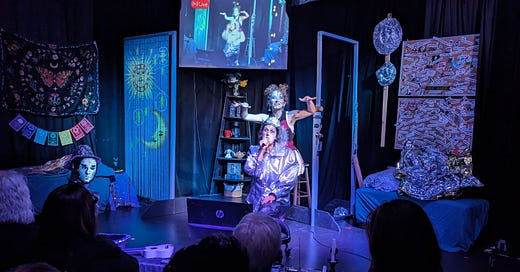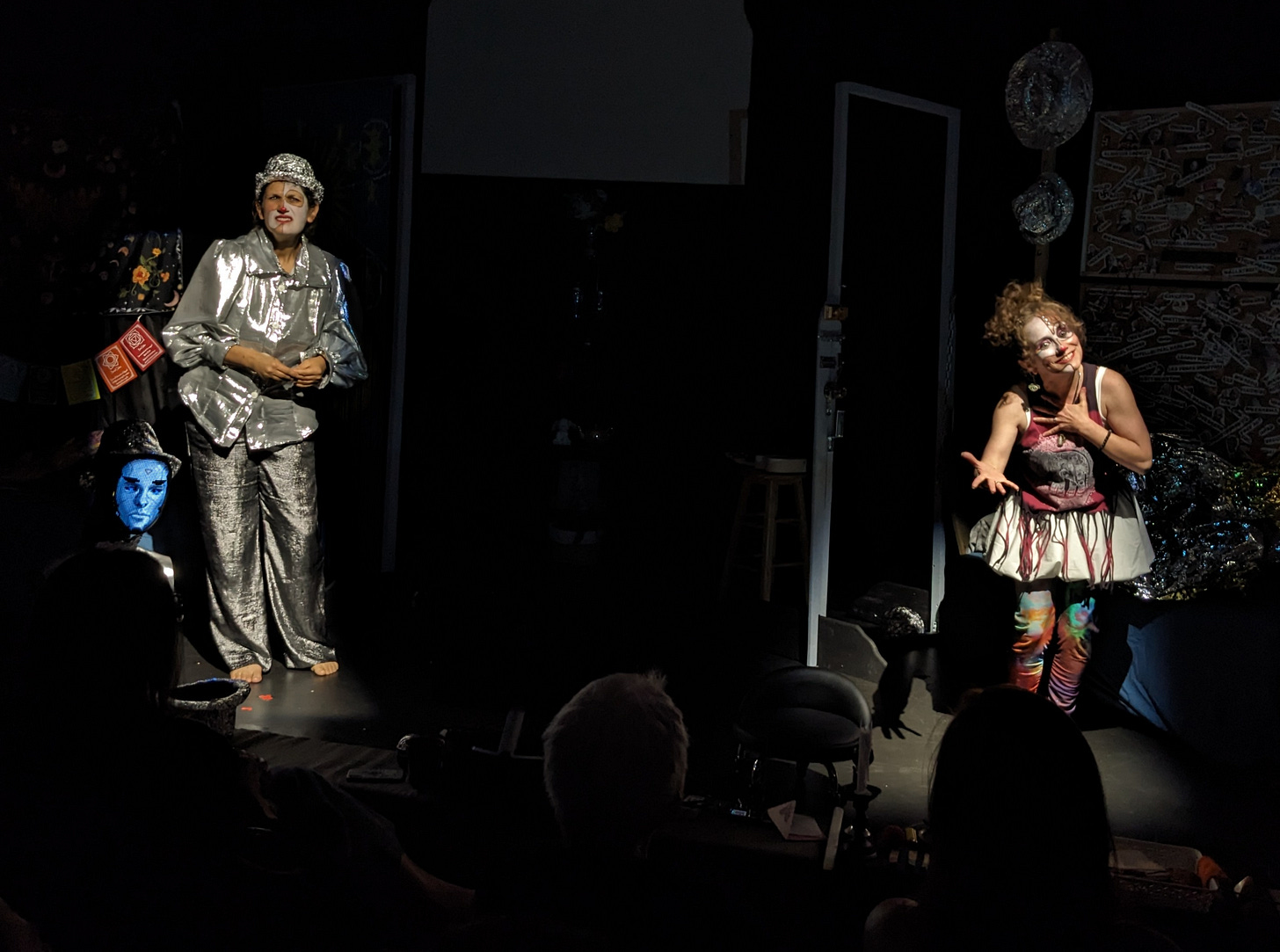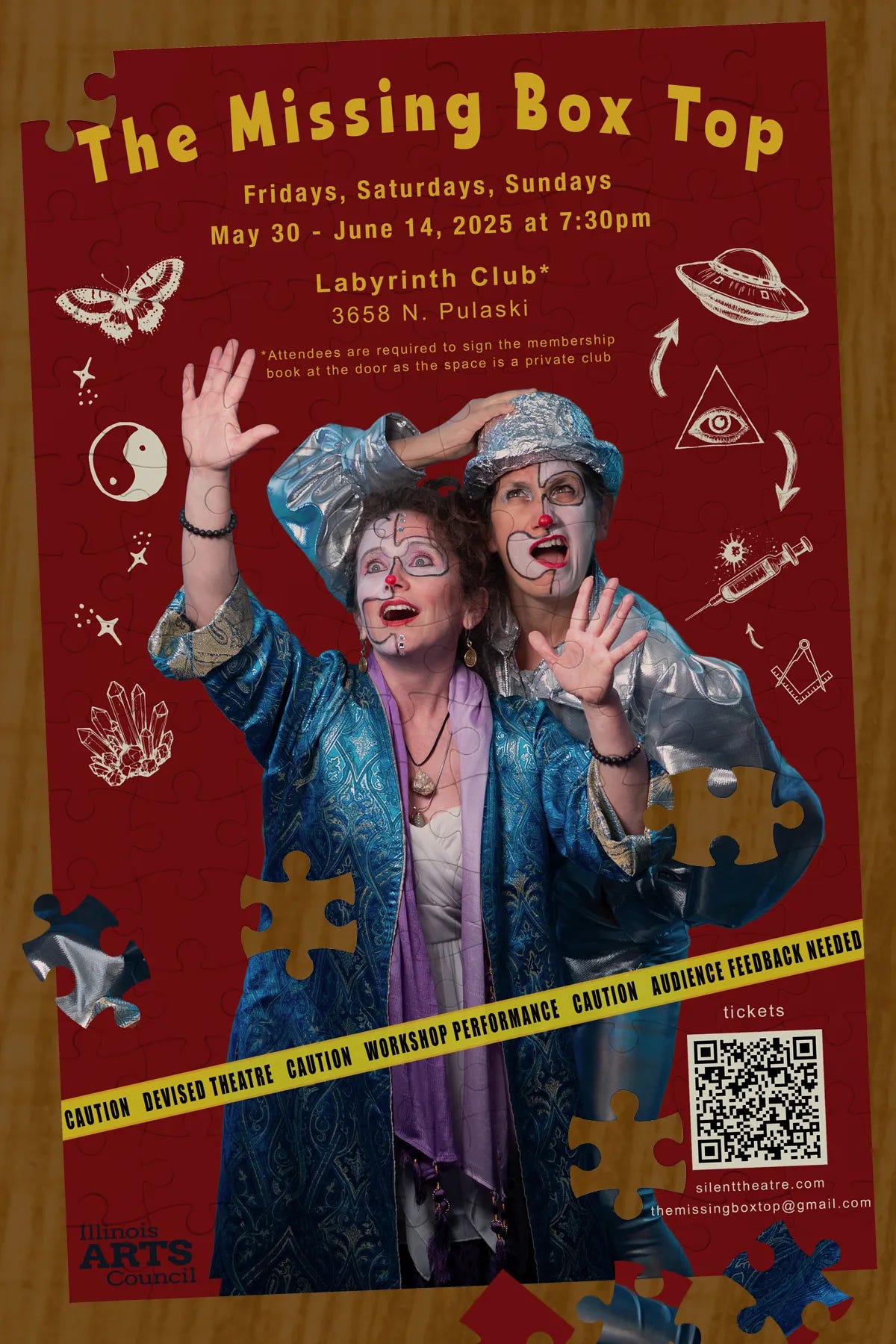"Three Weekends. Two Clowns. One Apocalypse."
A review of Silent Theatre's THE MISSING BOX TOP, playing at The Labyrinth Arts Club in Chicago. Final three shows: 6/13, 6/14 and 6/15
After the lights dimmed and before the show started, Diane Hamm (owner of The Labyrinth Arts Club, an artful, high-ceilinged private membership space where The Missing Box Top is playing) made a brief statement. A disclaimer, if you will. Along with the advisement to turn off cell phones, Hamm said this:
“Art is not here to keep you safe: it’s here to provoke, challenge and transmute.”
Not exactly a novel idea. Pretty much all U.S. theatres purport to be purveyors of challenge and catalysts of change, as well as bastions of open-mindedness and inclusivity — just read their mission statements.
But I’ve yet to encounter a declaration as bold as the next thing she said:
“This stage is a sacred space. We can choose to engage or disengage with the art, but NEVER to cancel, eliminate, or suppress it and free expression.”
And in the past five years, I’ve yet to see a play as courageous — or as entertaining — as The Missing Box Top.
Why? Because most theatres are not willing to produce anything even the least bit controversial. (Prove me wrong! Please!) But before I elaborate on that, I need to make my own brief disclaimer.
I am not unbiased as I write this review. I met one of its creators, Tonika Todorova, a few years ago through Substack, and we’ve developed a friendship that transcends the respect we share for each others’ work (and the project we collaborated on.)
So yes, I flew from Tampa to Chicago to see this play because I wanted to support her, and because I know that anything she creates is worth seeing. But I also wanted to support this project, and the free expression it exemplifies.
Tonika has created this “work in progress” with Gillian Hastings, a brilliant theatre artist she has known since their days working together as members of Silent Theatre, a Chicago-based performance art and multi-media troupe. They describe the show as “an adult clown show that juggles conspiracies and woo-woo,” which it is.
It’s also hilarious, touching, cerebral, and silly — and a theatrical bullseye for these times.
American theatre right now is mired in its own ideological quicksand. Convinced that it has cornered the market on “truth,” it excludes anyone and anything that resides outside that truth — all the while championing inclusivity.
Their stance is not only hypocritical, it’s a bummer. They, and their audiences, are missing out on a show like The Missing Box Top, whose beauty lies in its true inclusivity. Toni Woni and Gilly Willy, the two clowns played by Tonika and Gillian, cover so much territory in 90 minutes — from Malthusian Laws to butterfly biology — with such skill, compassion, and goofy goodness that it’s impossible not to laugh at some piece of yourself reflected in the mirror they are holding up. And isn’t that the point of theatre?
The plot of the show is simple:
Roommates Gilly Willy and Toni Woni disagree on almost everything, except their friendship. In the process of co-creating internet content, they are visited by an apocalyptic revelation which forces everything they believe out in the open, creating an existential crisis and threatening their relationship.
Even as I write that, I notice how weighty it sounds. Keep in mind, this is a clown show. This is, as one audience member stated post-show, “a serious show that doesn’t take itself seriously.”
Finally.
Historically, jesters have been the truth tellers at court; I’ve written about the role of comedians and Shakespearean fools here. Toni Woni and Gilly Willy each have their own versions of truth and they try to convince the other —and us — of their truths. But as their truths collide and they argue more and more vociferously, it becomes clear that the world they and we inhabit has become a nonsensical reality, a circus… and truth can’t be pinned down. Laughter is the only sane response, and there’s plenty of it.
Here’s an exchange that got me:
Gilly: So we can’t trust anything we’re presented with or anything we’ve been taught, but you want us to believe YOU? A tin-foiled clown?
Toni: When the clowns make more sense than the reality around you… perhaps it’s time to re-evaluate everything you know.
Tonika and Gillian use their finely-honed clowning skills to great effect, singing original songs which are equal parts touching (“War Song” and “Life Ditty”) and skewering (“Big Lies”), while simultaneously embodying larger-than-life characters that are still relatable. (I will not soon forget the image of Gillian physicalizing being born into this world knowing nothing.)
I’m glad they are performing this first run in a space like Hamm’s. Not only can they experiment freely without self-censorship as they continue to mold and shape the play, they also take full advantage of the cozy theatre’s intimacy. The creatively-designed set is tiny but somehow feels plenty big, and it allows the actors to connect authentically with the audience.
Which, by the way, seemed engaged, entertained, and intrigued by the play. People lingered after the curtain, eager to share impressions and relive certain moments. There was a lot of discussion. I remember thinking, How wonderful. I know how nervous Tonika was to publicly articulate certain ideas, and yet look at the conversations that are happening. This is what art is supposed to do.
I know I mentioned that this review is biased, and I’m saying it again now to preempt you as I write that this play is reminiscent of Waiting for Godot. (“She’s her friend! Of course she’d say that!”) The thing is, I actually overheard an audience member say that, and as soon as he did, I felt the recognition click into place: clowns searching for meaning, flailing and striving and laughing and crying as they do so.
Before I wrap this up, a few notes.
The use of technology: normally I’m not a fan of interspersing video with live acting, but here it feels necessary. Because the clowns’ daily existence requires that they interact with the digital world — they are content creators, after all — video must be utilized. It is seamlessly integrated into the narrative, and I was surprised at how much it added to my understanding and enjoyment of the show. (But I probably shouldn’t have been, given Tonika’s talents in video creation.)
Speaking of tech, there is another “character” I should mention: Al, the AI robot that lives with them. I saw the show on two consecutive nights, and on the first, Al performed flawlessly, drawing some big laughs. The second night, “he” was on the fritz, and though the actors covered nicely for his gaffs, it seems that some fine-tuning is needed.
There are some other small tightenings that the play could use, but that’s to be expected in a workshop performance. I hope Gillian and Tonika keep refining this play, and that other venues follow Hamm’s intrepid lead and produce it.
Even though The Missing Box Top covers extensive philosophical, political, intellectual, and spiritual territory, ultimately, it’s a simple story about friendship. Oddly enough, or appropriately enough, it takes two clowns to show us how to love one another — no matter what we believe and how much we disagree.
Isn’t that what real inclusivity looks like? And isn’t that exactly what the world needs right now?
The last three performances of The Missing Box Top are this Friday, Saturday, and Sunday (6/13, 6/14 and 6/15) at 7:30pm at The Labyrinth Arts Club, one of the best hidden gems in the city. Since it’s a private membership space, all guests must sign in to enter. $15 online tickets available to guarantee a seat, or pay-what-you-can at the door: “more if you got it, free if you’re broke!”








This put a humongous smile on my face, Mary, and I can't imagine how big a smile you had while watching such a delight from our brilliant, brave, and beautiful Apocaloptimistic sister Tonika!!
The first thing I thought when Tonika told us the idea of two clowns talking was "Waiting for Godot," so I'm really glad you brought that up!
I can't wait to see the video version! Only Tonika could figure out how to present a theatrical play in a video/digital format that is an elevation rather than a degradation, so I have great faith in her ability to pull that off.
The best treat for doing a silly clown show that might ruffle some feathers was to spend some quality time with you - even amidst the chaos that was my life last weekend. Thank you for coming and sharing a little bit of you, especially as you are in the middle of your own serious family troubles. And thank you for the wonderful conversations under the grape pergola. And thank you for writing your take away from the show and your spot on analysis of the state of theatre.
I’m deeply moved by your words and the words of our fellow Substackers here (way to make a broad blush, you guys!) and please know that many of you have contributed in some way, shape, or form to this production. It’s a living piece that would hopefully have a life beyond this presentation. I will work diligently on creating a viewable digital version of the live staged production. Stay tuned!